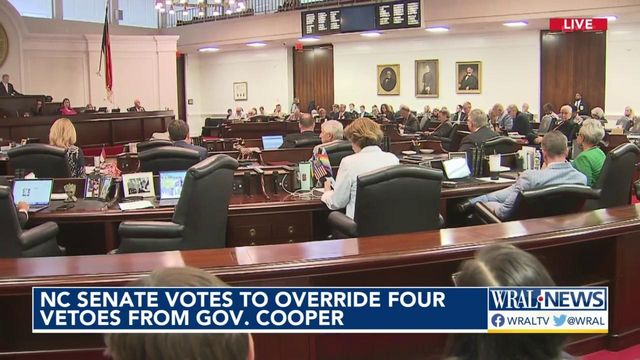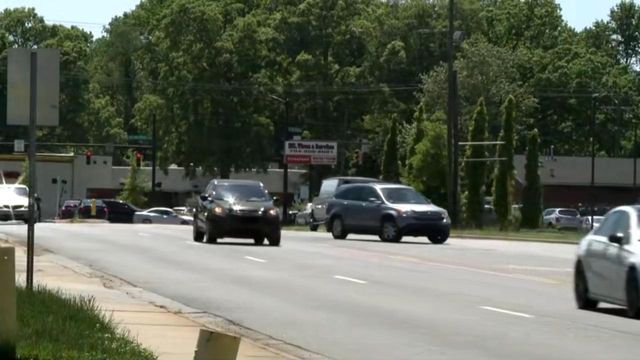NC Senate overrides Gov. Roy Cooper's veto of anti-DEI bill
Training programs that address racism and other biases are one step closer to being banned in North Carolina government workplaces after the state Senate overrode Democratic Gov. Roy Cooper’s veto of Senate Bill 364 on Tuesday.
The state House must also override Cooper's veto to make the bill law; that could happen as soon as Wednesday.
In addition to targeting trainings, the bill would also ban state agencies, ranging from the prison system to public universities and everything in between, from asking employees or prospective hires to state their opinions — or take any action — regarding “matters of contemporary political debate or social action.”
Sen. Warren Daniel, R-Burke, the bill’s lead sponsor, said it’s about protecting state employees’ First Amendment rights.
"The government should not be requiring its employees to think in a particular manner," Daniel said.
It’s unclear if the bill would ban all future human resource training focused on diversity, equity and inclusion, also called DEI. Democrats believe that’s the bill’s intent — it’s broadly written to ban training that touches on any of a dozen broad types of ideas related to sexism, white privilege, systemic racism and other related topics — but Republicans have tended to avoid answering that question directly.
When asked during a committee meeting earlier this year if the bill is meant to outlaw DEI trainings in state government, Daniel said: “This is about indoctrination training.”
Tuesday's veto override passed along party lines, with every Republican voting for it and every Democrat voting no.
After widespread Black Lives Matter protests in 2020, some universities began asking potential hires their views on diversity, and the medical school at UNC-Chapel Hill went a step further by telling faculty to engage in pro-diversity actions like mentoring minorities or reading a book about race for a book club. That policy has since been repealed, and similar ones banned by the university’s Board of Governors. But lawmakers want to stamp out other such actions statewide.
During that earlier committee hearing, Daniel said asking job applicants to state their views on diversity was a way for Democrats to make sure Republicans couldn’t get state jobs anymore.
Cooper said when he vetoed the bill last week that the legislature itself is proof anti-racist trainings are still needed. He pointed to an incident last month when Republican Rep. Jeffrey McNeely publicly questioned whether a Democratic lawmaker, Raleigh Rep. Abe Jones, would’ve gotten into Harvard had he not been a Black athlete.
"In North Carolina, the diversity of our people is a strength,” Cooper wrote when he vetoed this bill. “This legislation attempts to eliminate training that can help us understand the unconscious bias we all bring to our work and our communities. It is troubling that a legislature that witnessed open racism on the floor of the House of Representatives wants to stop training aimed at creating a more effective and understanding workforce.”
More veto overrides
Republicans have a veto-proof supermajority in the Senate. The chamber voted along party lines to override Cooper's vetoes Tuesday, a political reality the governor appeared to acknowledge in a social media post before the votes began.
"GOP Senate is rushing to override my vetoes of bills that hit consumers with higher interest rates and fees, try to eliminate unconscious bias training & take money from small communities that are late on audits instead of helping them," Cooper wrote. "These are the wrong priorities for NC."
Those other veto overrides all dealt with Senate Bills 299, 329 and 331. Like with the other bill, those also now all go to the House for final overrides.
Senate Bills 329 and 331 would allow lenders to charge higher interest rates and fees to borrowers around the state.
“At a time when the cost of living is rising, North Carolina consumers cannot afford to be hit with higher fees and interest rates on loans,” Cooper wrote when he vetoed the bill.
On Tuesday when the override passed, the bill's sponsor Sen. Jim Perry, R-Lenoir, said it's needed to help lenders deal with economic pressures.
"No one is immune to the impact of inflation," he said.
Senate Bill 229 would allow the state government to seize sales tax revenues from local governments that don’t submit audits on time. It comes on the heels of the state having to take over several small towns that ran into financial issues in recent years; in Spring Lake the town’s former finance director pleaded guilty last year to embezzling more than $500,000 from the town.
“While well intentioned, this legislation as written is likely to punish residents of some of our state’s smallest communities,” Cooper wrote when he vetoed the bill. “Rather than having state government seize sales taxes that are needed for local government, the North Carolina General Assembly should reconsider this legislation and provide more help for these communities to make sure they do it right rather than impose financial punishment that could make matters worse.”
But Cooper’s veto faced bipartisan opposition from State Auditor Beth Wood, a Democrat, and State Treasurer Dale Folwell, a Republican. Both have been involved in the state commission that takes over the struggling local governments. They wrote in a joint statement that the changes in the bill will help local taxpayers, not hurt them.
“When the leadership of governmental units fails to submit timely audits, the state has no insight into whether they are in financial difficulty,” the statement said. “The taxpayers hurt by this lack of transparency are often those on lower and fixed incomes.”











